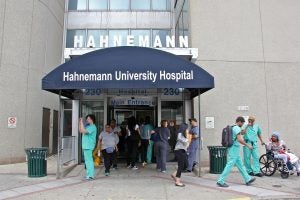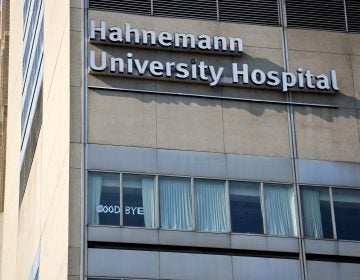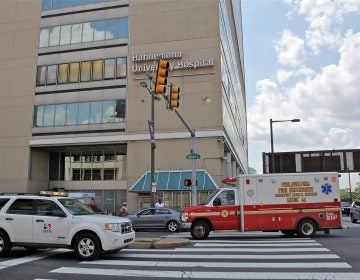Hahnemann residency programs draw winning bid of $55M from local health systems
A group of six local health systems outbid Reading-based Tower Health for the residency slots that had been assigned to Hahnemann University Hospital.

Hahnemann University Hospital. (Emma Lee/WHYY)
Updated 5:04 p.m.
—
Hahnemann University Hospital’s more than 550 residency slots have been sold at auction for $55 million to a consortium of six local health systems. Philadelphia-based Einstein Healthcare Network, Jefferson Health and Temple University Health System joined forces with Main Line Health, Cooper University Health Care in Camden and Christiana Care Health System in Wilmington to win the final bid in a lengthy auction process.
Hahnemann’s owner had reached an agreement to sell its residency slots for $7.5 million to Tower Health, which has six area hospitals in Philadelphia’s suburbs, Chestnut Hill, and Reading. Tower was outbid during an auction process Thursday, which caused Friday’s scheduled Chapter 11 bankruptcy hearing, required to approve the sale, to be postponed.
The Centers for Medicaid and Medicare Services funds the residency positions and has formally objected to the sale of the programs. In a court filing, “Hahnemann’s Provider Agreement terminates with its closure, making it ineligible to be transferred,” wrote U.S. Justice Department attorney Marc Sacks, adding that the plan was “contrary to the law” because the agreement would limit CMS’s ability to recoup its payment, and the buyer would not assume the liability for the residency programs.
Whether CMS’s objection will prevent the deal from going through will be determined in U.S. Bankruptcy Court in Wilmington.
“This unprecedented collaboration of academic institutions have been talking almost daily to make sure we take care of people who had nowhere else to go, many of them underserved patients, as well as medical trainees,” Stephen K. Klasko, president of Thomas Jefferson University and CEO of Jefferson Health, said in a statement Friday. “We’ve accepted large numbers of patients and current residents. Now, we want to ensure that the training positions remain in our region for the years to come. Our bid was motivated by the need to keep those positions permanently here in the tri-state area.”
“It is simply the right thing to do — for our community, and for the future health care providers of our region,” added Larry Kaiser, dean at the Lewis Katz School of Medicine at Temple University and president and CEO of Temple University Health System.
At issue is the long-term fate of the residency programs. Most of Hahnemann’s current medical residents have already secured positions at other hospitals, both locally and across the country.
Hahnemann was the main teaching hospital for Drexel University’s College of Medicine, which struck an academic agreement with Tower Health earlier this year. The auction’s results could throw a wrench in that since doctors in training at the medical school would not necessarily be placed at Tower hospitals.
In a statement Friday, Drexel spokesman Britt Faulstick said the College of Medicine remained committed to Tower Health, and that the academic affiliation with the health system will
“support the college’s M.D. and graduate programs, Tower’s existing residency programs, as well as building an additional location for the college in West Reading, Pa., which is slated to open for the 2021-22 academic year.”
If the residency slots do successfully transfer to the local group, there will be no formal affiliation with Drexel’s College of Medicine.
The auction was run by SSG Capital Advisors, the investment banking firm for Hahnemann’s owner, Joel Freedman. SSG founding partner and managing director J. Scott Victor ran the auction and said the sale price of the residency programs makes a much bigger dent in the debt owed to creditors than was expected.
“It’s a game-changer for this bankruptcy estate,” Victor said.
Hahnemann has about $87 million in unsecured trade debt, according to bankruptcy court filings. It owes $58 million to MidCap Financial, the hospital’s post-Chapter 11 petition lender, allowing the hospital to pay its bills as it winds down operations. The hospital’s former owner, Tenet Healthcare, says it is owed $41 million in unpaid information-technology services.
Hahnemann is still in the process of closing, but has no patients in the building. The owner of the 496-bed safety-net hospital, Freedman’s Philadelphia Academic Health System, announced in late June that the hospital would close and filed for Chapter 11 bankruptcy soon after.
Philadelphia Academic Health also owns St. Christopher’s Children’s Hospital, which will not close. St. Christopher’s is also scheduled to go to the highest bidder at an auction set for Sept. 18.
The fate of the two hospitals’ real estate, which is owned by a separate Freedman company, will not be decided in the Chapter 11 proceedings.
WHYY is your source for fact-based, in-depth journalism and information. As a nonprofit organization, we rely on financial support from readers like you. Please give today.






